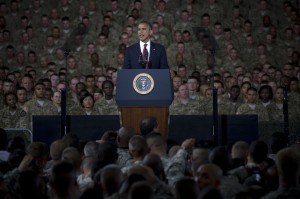
Converging Forces Factor Into Defense Strategy
September 5, 2012
Based on initial indications, this year’s upcoming presidential campaign is likely to feature the issues of defense and foreign policy highlighted disproportionately by the Democratic Party as compared to their opponents. The planning and execution of force draw-downs according to the Administration’s 2014 timetable for Afghanistan has been a focus of the recent convention. In light of intense polarization over domestic issues stemming from deficit reduction, completed military objectives like the depletion of the al Qaida leadership network provide substantive examples of decisive action from President Obama’s presidency.
Republican candidate Mitt Romney, in contrast, has chosen not to directly address military strategy in depth, presumably based on the negative publicity for extended military deployments in Iraq and Afghanistan. Escalated occurrences of insider attacks by Afghan troops on NATO forces of late have also further soured American public opinion over U.S. involvement as efforts are made to establish a stable Afghan government.
Clouding the matter further, the domestic political environment pertaining to deployments and nation-building is only one portion of how the defense apparatus will shape national security policy under potentially reduced budgets moving forward. In addition, there are two other important factors in determining military strategy: 1) the internal debates among non-partisan defense officials and 2) perceptions of U.S. tactics among foreign citizens and governments.
Within the defense community, there remains on ongoing debate over the efficacy of stability operations based on the doctrine espoused by current CIA director David Petraeus. Advocates of the dueling mandate – swift and decisive operations without extended occupation – argue that nation-building is too costly. By either calculation, it is difficult for policymakers to realistically expect the establishment of political and economic normalcy without some lasting presence in the host country. However, considering the increased fiscal restraint potentially required by $500 billion in arbitrary cuts over the next ten years through the sequestration process, allocations for said purposes are somewhat implausible.
Perhaps most difficult to acknowledge given America’s need to protect its national interests are the opinions of foreign populations regarding U.S. pursuit of foreign policy and military objectives. Policymakers need to remain cognizant that successful public diplomacy entails a wider snapshot than a NATO or UN Security Council negotiating table. National and international opinions on strategic involvement in locations such as Libya reflect a lack of support, especially among Islamic populations. Subsequently, a heightened sense of foreign politics and perceptions should be a major focus as policymakers weigh strategic options in developing situations including Iran and Syria.






